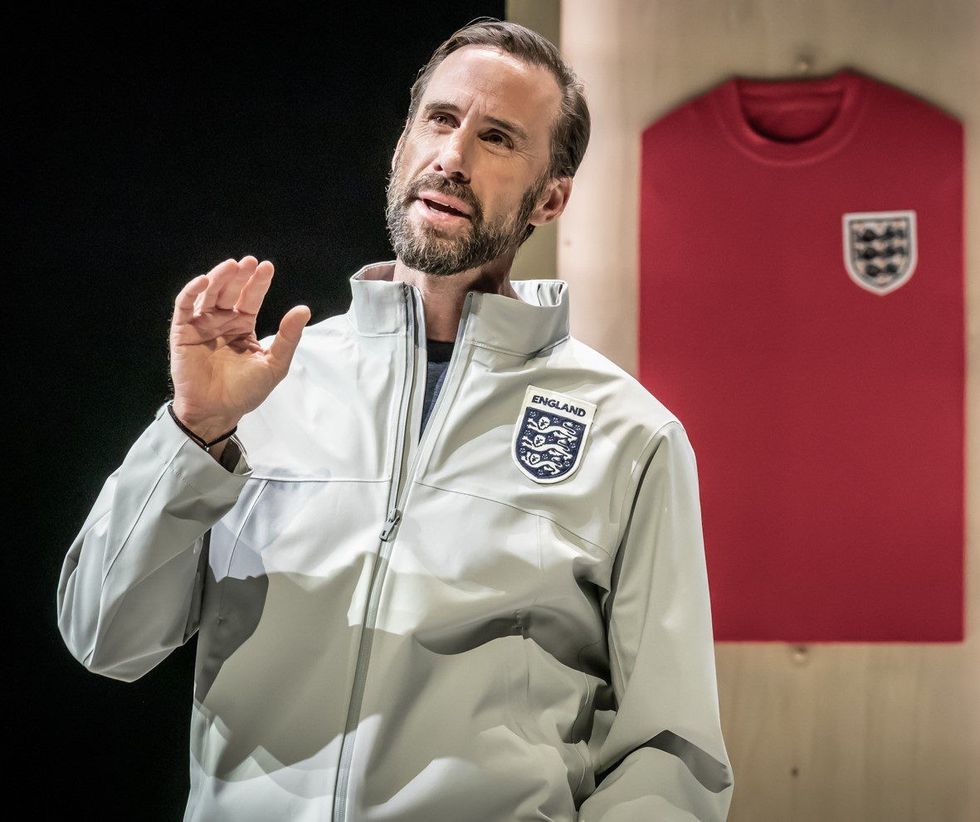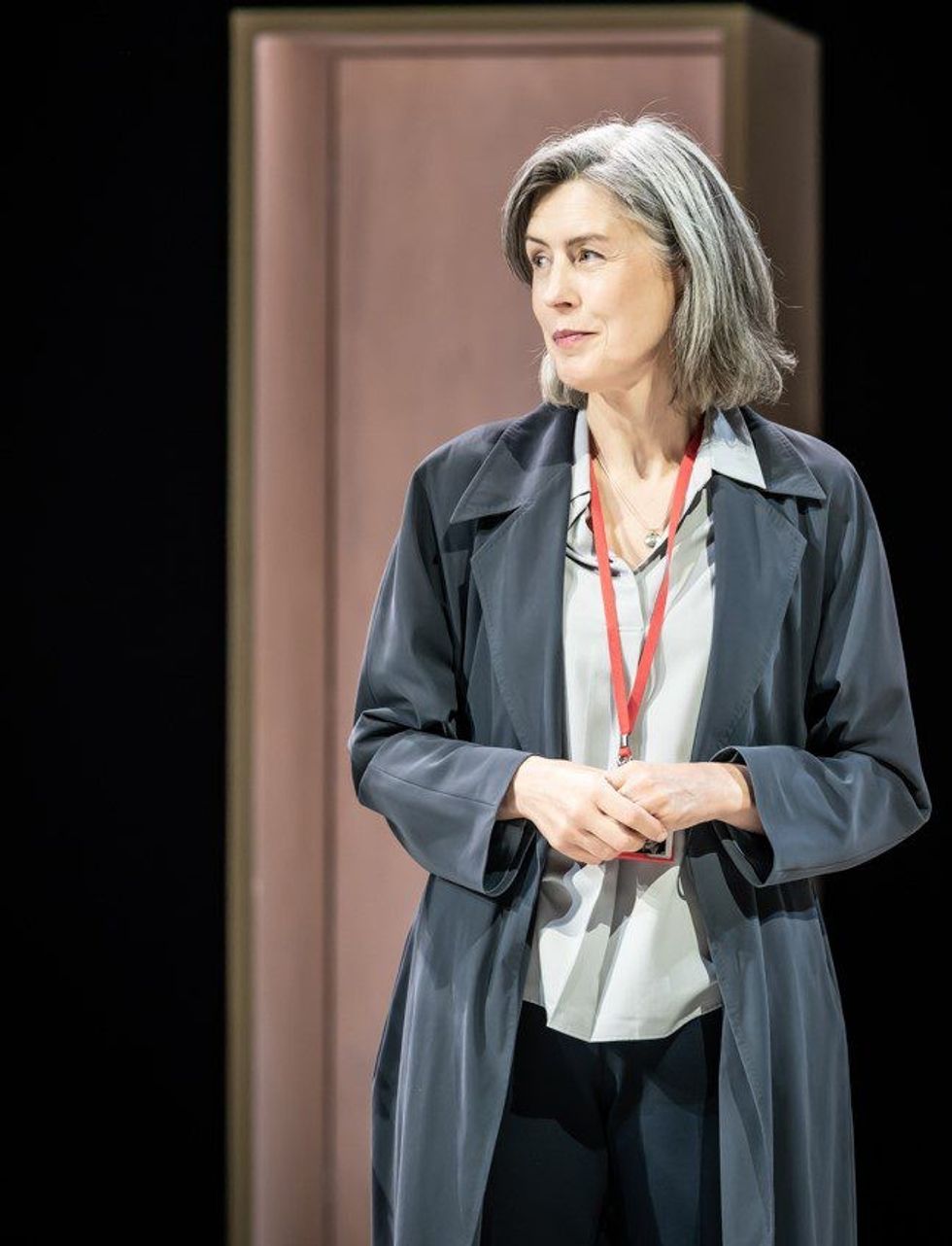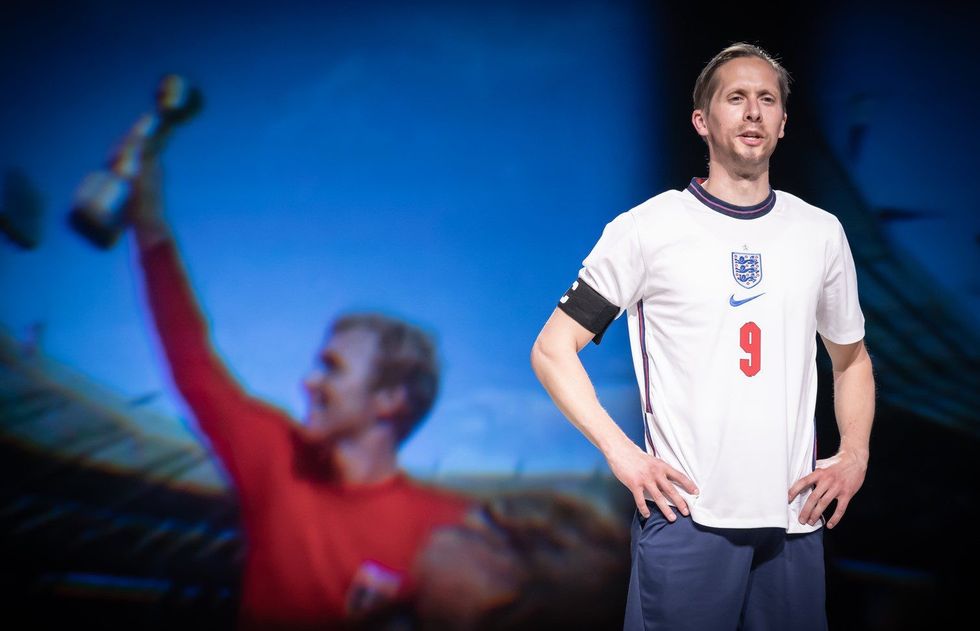WHAT does it mean to be English? This is the question that Dear England, a new play at London’s National Theatre, sets out to explore.
It has been written by James Graham and directed by Rupert Goold – with the actor Joseph Fiennes playing the lead role of the England football manager, Gareth Southgate.
It is commonplace for Asians, even those who have been born in this country, to say they feel “British”, but draw the line at describing themselves as “English”.
Talking about the play, the National’s artistic director, Rufus Norris, had said that Dear England is ostensibly about football, but at a deeper level, it is also not just about football but about such issues as English masculinity.
But to me, it seemed Dear England has a great deal to do with the national team’s proclivity for fluffing penalty shootouts.

Southgate has to live with the memory of missing a penalty against Germany in the Euro 1996 semi-final at Wembley – “the cathedral of football” – which sent England crashing out of the tournament.
Watching Dear England, it occurred to me there could easily be a similar play to do with the Indian cricket team’s habit of fluffing finals, as it managed to do in the recent World Test championship against Australia at the Oval. But any Indian who wrote such a play would almost certainly be trolled. The playwright would also probably face legal action for “hurting the sentiments” of the people, as happens all too frequently with controversial biographies and Bollywood films.
According to the old cliché, sport is not a matter of life and death – it’s far more important than that. The point is with cricket and especially with football, media coverage tends to be jingoistic. There is often a frenzy of flag-waving.
At one point, Southgate puts the white and red flag of St George on the ground and asks his young players what it means to them.
“Some people think I shouldn’t be wearing this shirt,” is the response from Raheem Sterling (played by Kel Matsena), who is among the black players grappling with racist fans and imperial history.
Southgate believes the England men’s failure to clinch a major title since 1966 is less connected with what happens on the field than with psychological problems in the mind.
“The problem is not on the pitch – it’s here,” he says, tapping his head. “I think we all have a problem with what it is to be English at the moment.”

He recruits a psychologist, Pippa Grange (Gina McKee), as “head of people and team development” to help build inner resilience. She hands out notebooks to the players so they can jot down their inner thoughts. When one of the old school on the coaching staff expresses scepticism at her appointment, she explains: “This is men dealing, or not dealing, with fear.”
Fiennes, in trademark waistcoat and striped tie, is excellent as the understated Southgate, who shows Wayne Rooney (Gunnar Cauthery) the door after taking over in 2016. A new captain, Harry Kane (Will Close), is appointed. His very ineloquence – if there is such a word – is itself eloquent. In a team address he talks of “my goals… apart from scoring goals…”

Along with Sterling, Southgate’s young lions include now familiar figures: Jordan Pickford (Josh Barrow), Jordan Henderson (Will Fletcher), Bukayo Saka (Ebenezer Gyau), Marcus Rashford (Darrah Hand), Harry Maguire (Adam Hugill), Dele Alli (Lewis Shepherd) and Eric Dier (Ryan Whittle).
Dear England is one of the best plays in London at the moment. Though nearly three hours long, the time just slips by in the recreation of dramatic moments in past games and the emotion of penalty shootouts.
In the 2018 World Cup in Russia, the psychological barrier is breached when England beat Colombia 4-3 on penalties, but lose 2-1 to Croatia in the semi-final.
There is heartache in the final of the UEFA Euro 2020 at Wembley (delayed by a year because of Covid), when England lose to Italy 3-2 on penalties. Afterwards, the team’s unsuccessful penalty takers (Rashford, Jadon Sancho and Saka) were subjected to racial abuse on social media.

And in the 2022 World Cup in Qatar, England lost 2-1 to France in the quarter-finals.
In the set designed by Es Devlin, the results are displayed cinematically on an illuminated ring with flashing red for missed penalties. It’s like being at an actual match. At a time when the nation is agonising over Brexit and the pandemic, characters who play Theresa May, Boris Johnson and Liz Truss also mess up when they take penalty kicks.
The title of the play is taken from the open “Dear England” letter Southgate addressed to fans in the middle of the pandemic on June 8, 2021.
“When you think of the grand scheme of things, perhaps football doesn’t seem so important,” he said. “And what I want to speak about today is much bigger than football.
“This idea that some players don’t know what it means to play for England – or don’t care – has become something of a false narrative.
“It’s their duty to continue to interact with the public on matters such as equality, inclusivity and racial injustice, while using the power of their voices to help put debates on the table, raise awareness and educate.
“I see players scrolling on their phones straight after the final whistle and I think … is that a particularly good idea?
“ Reading abusive comments on Twitter or Instagram is never going to help performances.
“There are genuine risks for our players online and I will always want to protect them, but I would never put rules on how or when they use their accounts while on England duty.
“I trust them and know they are mature enough to make their own decisions, to do what’s right for their mental health, and to keep being a force for good as we strive for a better society.
“However, there are things I will never understand.
“Why would you tag someone in on a conversation that is abusive?
“Why would you choose to insult somebody for something as ridiculous as the colour of their skin?
“Unfortunately, for those people that engage in that kind of behaviour, I have some bad news. You’re on the losing side. It’s clear to me that we are heading for a much more tolerant and understanding society, and I know our lads will be a big part of that.
“It might not feel like it at times, but it’s true. The awareness around inequality and the discussions on race have gone to a different level in the last 12 months alone. I am confident that young kids of today will grow up baffled by old attitudes and ways of thinking.
“For many of that younger generation, your notion of Englishness is quite different from my own. I understand that, too. “I understand on this island, we have a desire to protect our values and traditions – as we should – but that shouldn’t come at the expense of introspection and progress. We do have a special identity and that remains a powerful motivator.
“Of course, my players and I will be judged on winning matches.”
Southgate is staying on as England manager until after the UEFA Euro 2024 as the search for a trophy continues.
- Dear England is on at the Olivier Theatre at the National until August 11






 Naeli and the secret song
Naeli and the secret song









 Jamie Lloyd’s Evita with Rachel Zegler set for Broadway after London triumphInstagram/
Jamie Lloyd’s Evita with Rachel Zegler set for Broadway after London triumphInstagram/
 A compelling premise, layered and unpredictable charactersAMG
A compelling premise, layered and unpredictable charactersAMG Anyone who enjoys a gripping story with a diverse cast and unexpected twistsHarperFiction
Anyone who enjoys a gripping story with a diverse cast and unexpected twistsHarperFiction
 The Story Teller by Ley Roberts
The Story Teller by Ley Roberts Summer Exhibition coordinator Farshid Moussavi, with Royal Academy director of exhibitions Andrea Tarsia in the background
Summer Exhibition coordinator Farshid Moussavi, with Royal Academy director of exhibitions Andrea Tarsia in the background An installation by Ryan Gander
An installation by Ryan Gander A sectional model of DY Patil University Centre of Excellence, Mumbai, by Spencer de Grey
A sectional model of DY Patil University Centre of Excellence, Mumbai, by Spencer de Grey Rituals and Identity and Theatre of Resistance by Arinjoy Sen
Rituals and Identity and Theatre of Resistance by Arinjoy Sen
 An explosive new play that fuses biting satire, history and heartfelt storytellingPleasance
An explosive new play that fuses biting satire, history and heartfelt storytellingPleasance